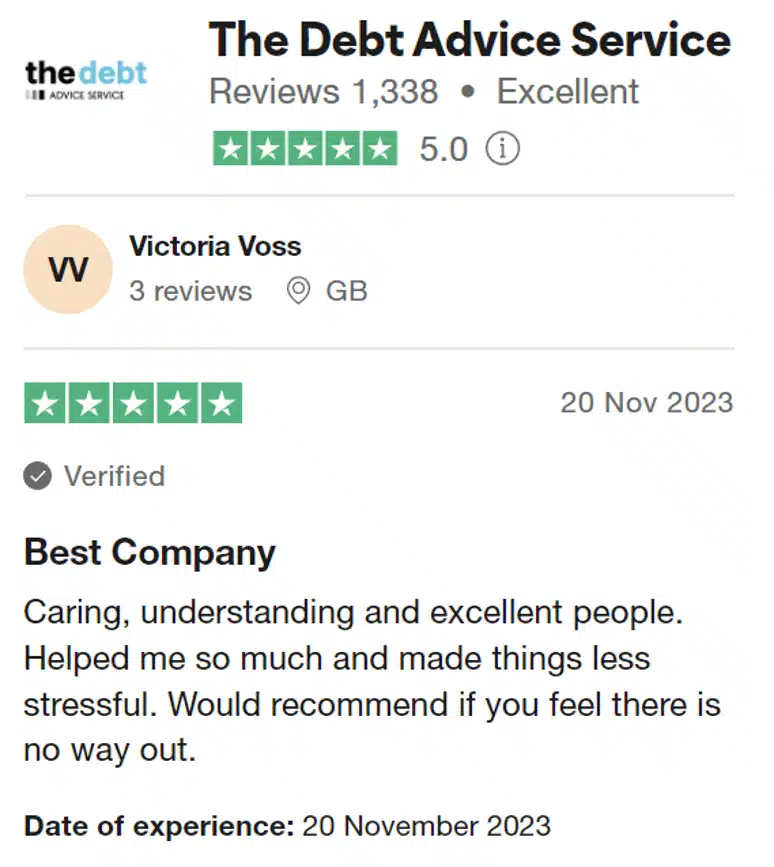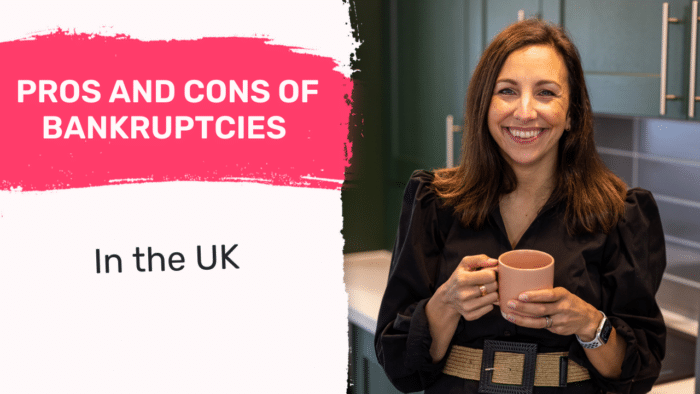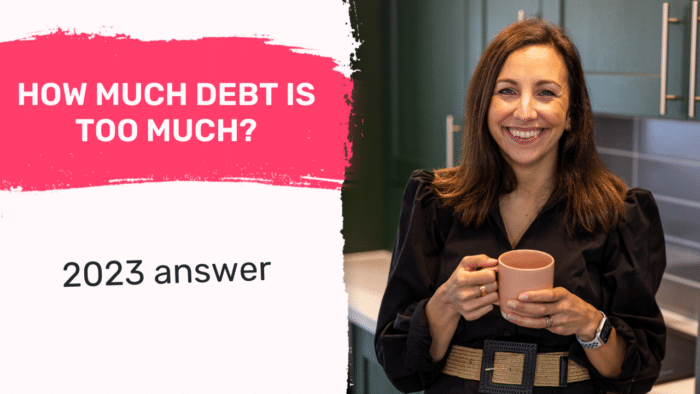What to do if you Can’t Afford to Live on Your Wage in the UK?
For free & impartial money advice you can visit MoneyHelper. We work with The Debt Advice Service who provide information about your options. This isn’t a full fact-find, some debt solutions may not be suitable in all circumstances, ongoing fees might apply & your credit rating may be affected.
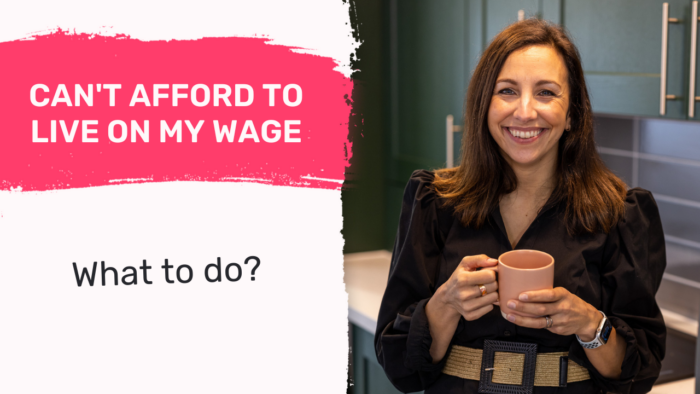
For free & impartial money advice you can visit MoneyHelper. We work with The Debt Advice Service who provide information about your options. This isn’t a full fact-find, some debt solutions may not be suitable in all circumstances, ongoing fees might apply & your credit rating may be affected.
If you’re finding it hard to live on your wage in the UK, this guide is here to help.
We understand that it’s tough when the cost of living is high, and wages just don’t seem to match up. But don’t worry; you’re not alone. Each month, over 12,000 people visit our site for advice on topics like this one.
In this guide, we’ll explore:
- How food banks in the UK can help
- Ways to lower your repayments
- Understanding what counts as a low-income household in the UK
- How to manage if you can’t afford to live on your own
- Dealing with debt and the options available to you
We know how hard it can be when you’re not earning enough to cover your costs. Many of us have been in the same boat, so we understand your worry.
But there are options out there, and we’re here to help you find them.
Why are wages in the UK so low?
Wages in the UK are low as compared to other well-off countries for several reasons. First, the free NHS healthcare system is subsidised which means everyone gets free treatments.
Second, there is an extremely competitive job market which means employers get to control how much they pay their employees.
In short, the demand for work outweighs the number of jobs available.
What is the current minimum wage in the UK?
I’ve listed the current UK minimum wage in the table below:
| Wage Band | Current Minimum Rate (April 1st, 2023) |
| 23 or over (National Living Wage) | £10.42 |
| 21 to 22 | £10.18 |
| 18 to 20 | £7.49 |
| Under 18 | £5.28 |
| Apprentice | £5.28 |
How a debt solution could help
Some debt solutions can:
- Stop nasty calls from creditors
- Freeze interest and charges
- Reduce your monthly
A few debt solutions can even result in writing off some of your debt.
Here’s an example:
Situation
| Monthly income | £2,504 |
| Monthly expenses | £2,345 |
| Total debt | £32,049 |
Monthly debt repayments
| Before | £587 |
| After | £158 |
£429 reduction in monthly payments
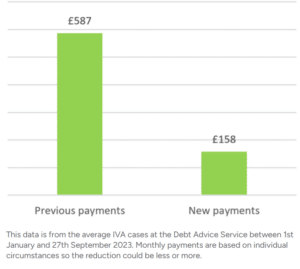
If you want to learn what debt solutions are available to you, click the button below to get started.
What can you do if you can’t live on your wage?
There are things you can do if you can’t live on your wage. For example, if possible you could increase how much you earn. Another option is to reduce your spending which could be the easiest way to resolve the problem!
I’ve listed how to reduce your expenses below:
1. Monthly expenses and spending habits
Take a look at your monthly expenses and spending and see what you can do without. If you start budgeting and cutting out what you don’t really need, it could help bring down your weekly/monthly expenses.
In short, you could think about not buying as many morning coffees or eating out less at lunchtime when you’re at work. You may be surprised at how much you could save just by doing this.
2. Think about changing energy providers
If you’re renting a property or you own your own home, you should think about switching energy providers. These days, it’s incredibly easy to do and you could save on your future gas or electricity bills.
Just by changing energy providers, you could save hundreds of pounds every year and the same could be true of internet providers!
3. Get in touch with your council
You may be entitled to a council tax discount if you’re on a low income or you live on a property where there’s only one working adult.
You could find you’ve overpaid on your council tax in which case, you’d be entitled to repayment.
The best way to find this out is to contact your local council to see what you could be entitled to. However, make sure you tell them the truth because the penalties for not being honest are severe.
4. Cancel non-essential services and subscriptions
Consider cancelling non-essential services and subscriptions. For example, you could cancel a magazine subscription or look at a Sky subscription and go back to a basic one.
You can always re-subscribe at any time further down the line if your financial situation improves.
5. Think about extra work
Ask your employer if you can work a few extra hours a month to increase the money you take home every month. You could even ask whether a pay rise could be a possibility if you think you can add something to the business thanks to your skills.
Another option is to think about a weekend job or do some freelance work from home.
6. Check online saving tips
Just by going online, you’ll find a ton of useful information on ways to save money. There are lots of sites and guides that provide tips on how to save money on things you need which could help you out of a hole.
What if you can’t afford to live on your own?
If you can’t afford to live on your own because rents have gone up, think about sharing a property with someone you know.
Multiple occupancies have been on the rise for several years thanks to the rise in the cost of living and stagnant wages.
Houses of Multiple Occupancy (HMOs) provide accommodation for workers who share a property but have their own bedrooms. However, there is a downside because the quality of some properties is often questionable.
Plus, rogue landlords snub their noses at regulations regarding fire safety and room sizes.
If you don’t think living with other people is a suitable option, you may want to think about living with your family or friends. It could be an option that saves you enough money to get a place of your own.
Thousands have already tackled their debt
Every day our partners, The Debt Advice Service, help people find out whether they can lower their repayments and finally tackle or write off some of their debt.

Natasha
I’d recommend this firm to anyone struggling with debt – my mind has been put to rest, all is getting sorted.
Reviews shown are for The Debt Advice Service.
What is considered a low-income household UK?
According to the Joseph Rowntree Foundation, a household with two children needs to bring in around £43,400 to meet an acceptable standard of living.
A person living on their own needs an income of £25,500 to meet the same standard!
That was in 2022 before the cost of living really started to take hold which saw more people finding it hard to make ends meet!
The current national median salary is set at a little over £31,000 a year!
If your household income is £12,400 or less, you’d struggle to live on your wages. But even people who earn £19,200 a year would also find it hard to pay bills and afford to buy food these days!
Do food banks work in the UK?
There’s a network of food banks throughout the UK all of which provide emergency groceries to people experiencing a food crisis. Trussell Trust is just one of the many charities that rely on donations from communities. Whether it’s a money or food donation to help people in need.
Check out this message posted on a popular online forum about food banks!


Source: Moneysavingexpert
What qualifies you to use a food bank?
Food banks are run by charities and therefore, anyone who needs help can get the necessities they need to live by visiting one of the centres.
This includes people who are:
- UnemployedEmployed but can’t live on their wages
- Homeless
So, if you’re struggling to make ends meet and you need to prioritise paying bills over food, you could go to a food bank knowing you won’t be turned away.
In short, UNISON believes that there are 13 million low-income households in the UK!
How many UK households rely on food banks?
According to Statista, the number of households that rely on food banks increased every year from 26,000 to over 2.56 million from 2008/09 to 2020/21!
How much do you need to earn to live comfortably?
It depends on your personal circumstances as to how much you’d need to earn to live comfortably. For example, where you live will have an impact on your cost of living and how comfortably you are off.
The number of people in your household will also need to be factored in. If you have children, your weekly expenses are going to be significantly higher than those of a single person.
There’s a minimum income calculator on the Raisin website that gives you a rough idea of how much you’d need to earn to live comfortably.
I’ve listed how much you’d need to earn to live relatively comfortably in the table below although it’s only a rough guide:
| Single Person Under Pension Age | Earnings |
| No children | £20,383 |
| One child under 1 year old | £44,714 |
| One child aged 2 to 4 | £23,844 |
| One child primary school age | £24,883 |
| One child secondary school age | £30,863 |
| Couple With Combined Income | |
| No children | £27,340 |
| One child up to 1-year-old | £49,714 |
| One child aged 2 to 4 | £30,863 |
| One child is primary school age | £31,902 |
| One child secondary school age | £33,325 |
Are you struggling with debt on low pay?
If you’re building up debts on credit cards just to get you through the month, you may find the debts get too much to pay back.
You should contact your creditors sooner rather than later if you’re finding it hard to pay what’s owed on your credit cards.
You may find that lenders are willing to offer you a reduced repayment plan. It could help you make the monthly payments on time without building up more debt arrears.
Whatever you do, don’t ignore the problem because the situation could get worse. Debt collectors may get involved which could make matters even worse!
What other options do you have?
There are several options when you’re struggling to make ends meet and you’re getting deeper into debt. You should seek advice from an expert to avoid getting further into debt and being contacted by a debt collection agency!
I’ve listed some solutions you may like to consider in the list below:
- Debt Relief Order (DRO)
If you’re on a low income with less than £75 disposable income every month, you could write off your debts with a Debt Relief Order (DRO). It could be an option worth considering if you don’t own any assets or have any savings.
Creditors can’t chase you for payments or start legal action for 12 months when you enter into a DRO. Plus, all your debts could be written off if your disposable income doesn’t increase by the end of the 12 months.
If a DRO isn’t possible, you could ask lenders to freeze interest payments on money owed every month.
It’s also worth noting that you can’t apply for a DRO yourself. This has to be done by an authorised debt adviser.
- Individual Voluntary Arrangement
Individual Voluntary Arrangements (IVAs) are legally binding agreements made between your creditors and you. The arrangement involves paying back the money you owe over a set period.
The arrangements are approved by the courts which means creditors must abide by them.
Your creditors should:
- Stop charging any interest on the money you owe them
- Stop chasing you to settle your debts
That said, while you are in an Individual Voluntary Arrangement, you must:
- Make sure you meet the agreed monthly payments if it’s not a lump sum
- Tell your IVA provider if and when your earnings go up or you get money from elsewhere
- Do not apply for new credit without asking an IVA provider’s permission first
It’s worth noting that if the total debt is less than £10,000, an Individual Voluntary Arrangement may not be the best option.
Also, only an insolvency practitioner can set up an IVA. Plus, you’d have to pay a fee to the practitioner.
- Debt management plan
Debt Management Plans (DMPs) are informal agreements you come to with creditors to pay back non-priority debts.
This includes the following:
- Credit cards
- Loans
- Store cards
You get to pay back all your debts by making one single monthly payment that’s divided up between your creditors.
DMP providers typically manage these agreements and they deal with the creditors on your behalf. It takes the stress and pressure off you having to deal with them.
It’s worth noting that a Debt Management Plan isn’t legally binding which means you can cancel it at any time.
YOUTUBE LINK: https://www.youtube.com/watch?v=zcJI3XwRy9o
Before, choosing a debt solution to suit your circumstances isn’t easy which is why it’s best to seek advice beforehand.
Lastly, what to do if you can’t afford to live on your wage (Recap)
If you’re struggling to make ends meet because your earnings don’t stretch far enough, you’re definitely not alone.
More households than ever are finding it hard to pay bills, heat a home and put food on the table.
There are things you could do and ways to reduce your monthly outgoings. First, you should make a list of essential outgoings. Next, contact energy providers to see if you can get a better deal by switching suppliers.
You could also ask your employer about a pay rise or working a few extra hours every week. Maybe think about taking on some other work if that’s at all possible.
When it comes to any debts you may have, it’s best to stay in touch with the lenders. Let them know that like many other people, you’re struggling with your finances.
They may set up an affordable repayment plan for you. One you can afford so you don’t default on any payments!
If you need advice, contact one of the charities that provide free debt advice. They could point you in the right direction when it comes to choosing a solution to your debt problems!
Would you like more advice about debts?
Then why not check out my other post on ways to get out of debt and your life back on track.
